 W
W1 Timothy 2:12 is a New Testament passage from the pastoral epistle by that name, traditionally attributed to the Apostle Paul. It is familiarly quoted using the King James Version translation:But I suffer not a woman to teach, nor to usurp authority over the man, but to be in silence.
 W
WAllegorical interpretations of Genesis are readings of the biblical Book of Genesis that treat elements of the narrative as symbols or types, rather than viewing them literally as recording historical events. Either way, Judaism and most sects of Christianity treat Genesis as canonical scripture, and believers generally regard it as having spiritual significance.
 W
WThe Aramaic original New Testament theory is the belief that the Christian New Testament was originally written in Aramaic.
 W
WThe Beast may refer to one of two beasts described in the Book of Revelation.
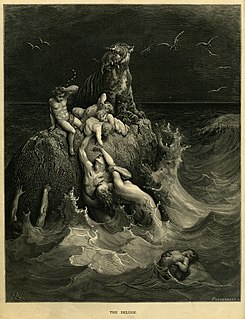 W
WThe Hebrew Bible and the New Testament contain narratives, poetry, and instruction describing, recording, encouraging, commanding, condemning, rewarding, punishing and regulating violent actions by God, individuals, groups, governments, and nation-states. Among the violent acts included are war, human sacrifice, animal sacrifice, murder, rape, genocide, and criminal punishment. The texts have a history of interpretation within the Abrahamic religions and Western culture that includes justification and opposition to acts of violence.
 W
WBiblical literalism or biblicism is a term used differently by different authors concerning biblical interpretation. It can equate to the dictionary definition of literalism: "adherence to the exact letter or the literal sense", where literal means "in accordance with, involving, or being the primary or strict meaning of the word or words; not figurative or metaphorical".
 W
WBiblical literalist chronology is the attempt to correlate the theological dates used in the Bible with the real chronology of actual events. The Bible measures time from the date of Creation, but there is no agreement on when this was. Some of the better-known calculations include Archbishop James Ussher, who placed it in 4004 BC, Isaac Newton in 4000 BC, Martin Luther in 3961 BC, the traditional Hebrew calendar date of 3760 BC, and the traditional Greek Orthodox date, based on the Septuagint, of 5509 BC. To the foundation of the Temple of Solomon the passage of time is measured by simple addition of from the Creation; for later periods it measures time by the reigns of kings, but the data is conflicting and there is no agreement on how to resolve the problems.
 W
WThe Sabbath is a weekly day of rest or time of worship given in the Bible as the seventh day. It is observed differently in Judaism and Christianity and informs a similar occasion in several other faiths. Though many viewpoints and definitions have arisen over the millennia, most originate in the same textual tradition of "Remember the sabbath day, to keep it holy".
 W
WThe New Testament describes James, Joseph (Joses), Judas (Jude), and Simon as brothers of Jesus. Also mentioned, but not named, are sisters of Jesus. Some scholars argue these brothers, especially James, held positions of special honor in the early Christian church.
 W
WMatthew 10 is the tenth chapter in the Gospel of Matthew in the New Testament section of the Christian Bible. Matthew 10 comes after Jesus had called some of his disciples and before the meeting with the disciples of John the Baptist. This section is also known as the Mission Discourse or the Little Commission, in contrast to the Great Commission. The Little Commission is directed specifically to the Jewish believers of the early church, while the Great Commission is to all nationalities. The Pulpit Commentary suggests that Jesus' message in this discourse "was hardly likely to have been remembered outside Jewish Christian circles".
 W
WAccording to the Hebrew Bible, circumcision was enjoined upon the biblical patriarch Abraham, his descendants and their slaves as "a token of the covenant" concluded with him by God for all generations, as an "everlasting covenant".
 W
WDavid and Jonathan were, according to the Hebrew Bible's Books of Samuel, heroic figures of the Kingdom of Israel, who formed a covenant, taking a mutual oath.
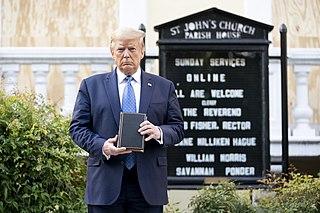 W
WOn June 1, 2020, amid the George Floyd protests in Washington, D.C., law enforcement officers used tear gas and other riot control tactics to forcefully clear peaceful protesters from Lafayette Square and surrounding streets, creating a path for President Donald Trump and senior administration officials to walk from the White House to St. John's Episcopal Church. Trump held up a Bible and posed for a photo op in front of Ashburton House, which had been damaged by a fire during protests the night before.
 W
WIn Christian hamartiology, eternal sins, unforgivable sins, unpardonable sins, or ultimate sins are sins which will not be forgiven by God. One eternal or unforgivable sin is specified in several passages of the Synoptic Gospels, including Mark 3:28–29, Matthew 12:31–32, and Luke 12:10.
 W
WThere are a number of passages in the Hebrew Bible and the New Testament that have been interpreted as involving same-sex sexual acts and desires. These interpretations form the basis of Jewish and Christian attitudes towards homosexuality.
 W
WIn the New Testament (NT), there are at least three passages that refer to homosexual activity: Romans 1:26–27, 1 Corinthians 6:9–10, and 1 Timothy 1:9–10. A fourth passage, Jude 1:7, is often interpreted as referring to homosexuality. Jesus discusses marriage only in a heterosexual context when he cites the Book of Genesis during a discussion of marriage.
 W
WThe Quran mentions the Torah, the Zabur ("Psalms") and the Injil ("Gospel") as being revealed by God to the prophets Moses, David and Jesus respectively in the same way the Quran was revealed to Muhammad, the final prophet and messenger of God according to Muslims. However, Muslims generally view these books as having been corrupted, altered and interpolated over time, while maintaining that the Quran remains as the final, unchanged and preserved word of God.
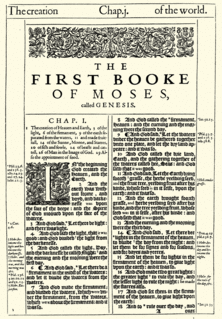 W
WThe King James Only movement asserts that the King James Version (KJV) of the Bible is superior to all other English translations of the Bible. Adherents of the King James Only movement, largely members of evangelical, conservative holiness movement, traditional High Church Anglican, and Baptist churches, believe that the KJV is the greatest English translation ever produced, needing no further improvements, and they also believe that all other English translations which were produced after the KJV are corrupt.
 W
W"The law of Christ" is a New Testament phrase most likely referring to the two commandments mentioned by Jesus: "you shall love the Lord your God with all your heart and with all your soul and with all your mind and with all your strength.” and “You shall love your neighbor as yourself.”(Leviticus 19:18b) There is no other commandment greater than these.’” The related Bible verses are in the Pauline Epistles at Galatians 6:2 and parenthetically at 1 Corinthians 9:21.
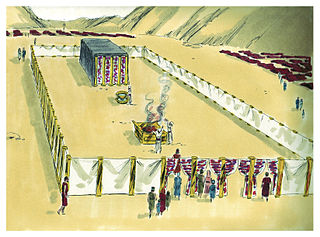 W
WLeviticus 18 deals with a number of sexual activities considered abominable, including incest, bestiality and "lying with a man as with a woman.". It is part of the Holiness Code and its sexual prohibitions are largely paralleled by Leviticus 20, except that chapter has more emphasis on punishment.
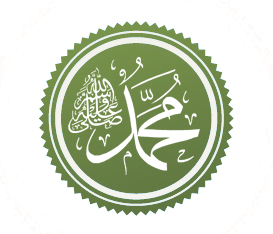 W
WArguments that prophecies of Muhammad exist in the Bible have formed part of Muslim tradition from the early history of Muhammad's Ummah. A number of Christians throughout history, such as John of Damascus and John Calvin, have interpreted Muhammad as being the Antichrist of the New Testament.
 W
WThe "New Perspective on Paul" represents a significant shift in the field of biblical studies since the 1970s in the understanding of the writings of the Apostle Paul, due to E. P. Sanders' pioneering 1977 work Paul and Palestinian Judaism.
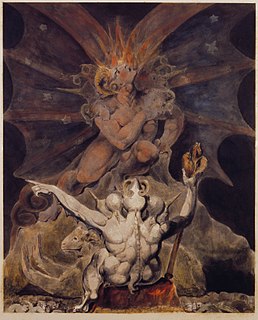 W
WThe number of the beast is associated with the Beast of Revelation in chapter 13, verse 18 of Book of Revelation. In most manuscripts of the New Testament and in English translations of the Bible, the number of the beast is six hundred and sixty-six or χξϛ. Papyrus 115, as well as other ancient sources like Codex Ephraemi Rescriptus, give the number of the beast as χιϛ or χιϲ, not 666; critical editions of the Greek text, such as the Novum Testamentum Graece, note 616 as a variant.
 W
WThe Mosaic covenant or Law of Moses – which Christians generally call the "Old Covenant" – has played an important role in the origins of Christianity and has occasioned serious dispute and controversy since the beginnings of Christianity: note for example Jesus' teaching of the Law during his Sermon on the Mount and the circumcision controversy in early Christianity.
 W
WPaul the Apostle has been placed within Second Temple Judaism by recent scholarship since the 1970s. A main point of departure with older scholarship is the understanding of Second Temple Judaism, the covenant with God and the role of works, as a means to either gain, or to keep the covenant.
 W
WThe Pauline privilege is the allowance by the Roman Catholic Church of the dissolution of marriage of two persons not baptized at the time the marriage occurred. The Pauline privilege is drawn from the apostle Paul's instructions in the First Epistle to the Corinthians.
 W
WThe primacy of Peter, also known as Petrine primacy, is the position of preeminence that is attributed to Saint Peter among the Twelve Apostles.
 W
W W
WThe slave bible is an edition of the Bible specifically made for educating slaves. Its full title was: Select Parts of the Holy Bible for the use of the Negro Slaves in the British West-India Islands. It was produced in England in the early 19th century for use in the British West Indies. Such bibles had all "references to freedom and escape from slavery" excised, while passages encouraging obedience and submission were emphasized.
 W
WThe Bible contains many references to slavery, which was a common practice in antiquity. Biblical texts outline sources and legal status of slaves, economic roles of slavery, types of slavery, and debt slavery, which thoroughly explain the institution of slavery in Israel in antiquity. The Bible stipulates the treatment of slaves, especially in the Old Testament. There are also references to slavery in the New Testament.
 W
WSodom and Gomorrah were two cities mentioned in the Book of Genesis and throughout the Hebrew Bible, the New Testament, and in the deuterocanonical books, as well as in the Quran and the hadith.
 W
WTwo-Seed-in-the-Spirit Predestinarian Baptists are part of a larger sub-group of Baptists that is commonly referred to as "anti-mission" Baptists. This sub-group includes the Duck River and Kindred Baptists, Old Regular Baptists, some Regular Baptists and some United Baptists. Only a minuscule minority of Primitive Baptists adhere to the Two-Seed doctrine. The primary centers of Two-Seedism were in Northern Alabama, Arkansas, Eastern Tennessee, Florida, Georgia, Illinois, Indiana, and Texas. As of 2002, five churches or congregations of this faith and order still existed in Alabama, Indiana, Tennessee, and Texas.
 W
WBabylon the Great, commonly known as the Whore of Babylon, refers to both a symbolic female figure and place of evil mentioned in the Book of Revelation in the Bible. Her full title is stated in Revelation 17 as Mystery, Babylon the Great, the Mother of Prostitutes and Abominations of the Earth.
 W
WThere are many notable narratives of women in the Bible as both victors and victims, women who change the course of events, and women who are powerless and unable to affect their own destinies. Though their stories are told, most of those stories do not include their names. Named women make up only 5.5 to 8 percent of all named characters in the Bible. One possible explanation for this is that women were not usually in the forefront of public life. Those women who are named are prominent for reasons outside the ordinary. They are often involved in the overturning of human power structures in a common biblical literary device called "reversal." Abigail and Esther, and Jael, who drove a tent peg into the enemy commander's temple while he slept, are a few examples of women who turned the tables on men with power. The founding matriarchs are mentioned by name, as are some prophetesses, judges, heroines, and queens, while the common woman is largely, though not completely, unseen. The slave Hagar's story is told, and the prostitute Rahab's story is also told, among a few others.